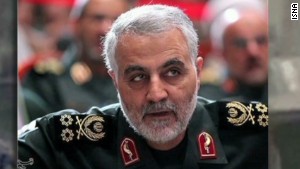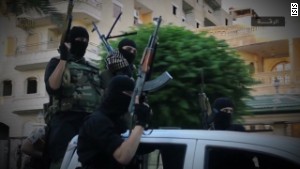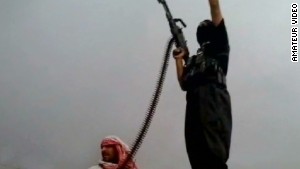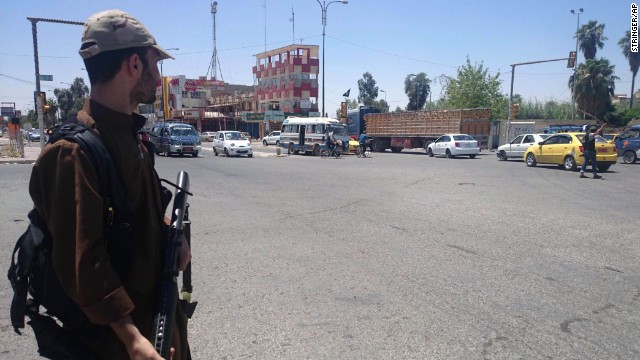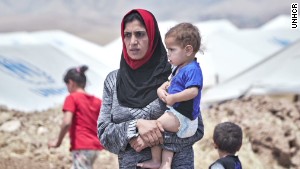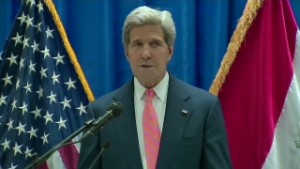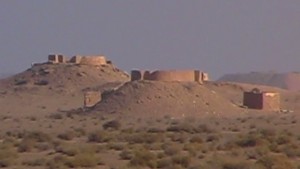JUNE 26, 2014, AT 10:32 AM

ISIS may merely be a smoke screen.Photo: (REUTERS/Stringer)
Here is the most popular argument for why the U.S. should stay out of Iraq, once and for all:
What in the world are we doing over there in the first place? ISIS's advance is the fault of a weak Prime Minister, and the war they're fighting is really a war about religion, resource control, and respect, the same wars that festered for centuries, with little bearing on the safety of Americans in the region and posing no threat to the homeland. The most vital American interest: Iraq's oil supply. The second most vital: assuaging guilt, because we're kind of at fault for igniting the war in the first place, having invaded a sovereign country because the Middle East needed shaking up, and then having botched the aftermath, trying to impose an American-style democracy on people who have good reason to mistrust the West and whose religious values counter Western secularism as a rule. Oil and guilt are not solid reasons to intervene in a crisis.
Those who want to intervene in the wars between Sunni insurgents and the Iraqi government in Iraq really can't make the case that America's national security is directly threatened. War-weariness has reduced the strategic ambition of Americans and correspondingly, narrowed the scope of what constitutes a direct threat to our security. Perhaps it does not have to be an existential threat, but bad people doing bad things to other people over there does not a direct threat create. So when national security conservatives today use the same language and rhetoric that rallied public opinion 12 years ago to justify a massive, permanent American presence in the region, it falls flat. Here's what the Wall Street Journal editorial board has to say:
No one should underestimate the danger this presents to the stability of the region and to America's national and economic security. An extended civil war seems to be the best near-term possibility. More dangerous is ISIS's ambition to establish a Muslim caliphate in the heart of the Persian Gulf, which would mean a safe haven for Islamic terrorism that would surely target the U.S. The danger to Iraq's oil exports of three million barrels a day is already sending prices up and global equities down. [Wall Street Journal]
ISIS may have just won the lottery, in that, luckily for the group, those who call for U.S. military action against it are quite unpopular. ISIS's anti-American bluster is worth noting, as are its direct ties to lethal insurgents elsewhere. But surely the way to expedite the fermentation of the next wave of Sunni terrorism is for the U.S. to start fighting Sunnis.
Interestingly enough, the central tenet of President Obama's counter-terrorism policy is NOT to deny terrorists safe havens. Our counter-terrorism policy is mocked by critics as little more than a game of whack-a-mole. And they're right. A terrorist pops up here; so here is where you send the drone. Mole whacked.
But a "broader" counter-terrorism strategy would involve a lot more skin than Americans are willing to shed. We've denied al Qaeda a safe haven in Afghanistan. We've tried appeasing. We've tried waging war. We've tried policy shifts. We've even said mean things to Israel. And yet, terrorism endures. The folks who get paid to counter terrorists eventually settled on a less ambitious goal: work to reduce the likelihood that terrorists can obtain weapons of mass destruction, easily kill large numbers of Americans, or take governments hostage. The means: intelligence, limited air strikes, drone wars, and hardening the target here at home.
So yes, "core al Qaeda" was routed in Afghanistan, but terrorism endured, Pakistan degenerated into a civil war, and Obama's own non-secret-but-classified drone war against insurgents continues. The bad guys of tomorrow were in Pakistan. They are now in Yemen and the Sahel and Lebanon and Syria.
The "safe haven" argument is a policy designed to fight the world as it existed before September 11, 2001, when al Qaeda allegedly used the relative sanctuary provided by the Taliban in Afghanistan to plan, train, and launch that attack; when it was harder for terrorists to recruit and communicate worldwide; and when people inclined to immolate themselves in the name of God somehow found the threshold for doing so a little higher.
I say allegedly, because a lot of the planning for 9/11 took place in Indonesia. And in Germany. And much of the training took place here in the United States, at flight schools. Osama bin Laden took advantage of the safe haven provided by the Taliban, but his deputies were able to flee to other countries, and America has spent the past 12-off years pursuing them.
The reason why the threat of an existential terrorist attack is lower today is not simply because the U.S. denied al Qaeda a safe haven. It is because the U.S. declared war against Islamic terrorism worldwide, developed an enormous intelligence apparatus to sniff it out, and today, because, even with all the bad stuff that comes with it, Americans are able to stomach that fight. If all the terrorists in the world found themselves attracted to a caliphate between Syria, Kurdistan and Iraq, they would make the country a ripe target for later, purposeful intervention by the United States. Right now, the threats to the U.S. are bluster. Keeping a response to an intelligence and special operations force surge to Iraq is a good way to make sure that, whatever happens — and really, there is no way of knowing what ISIS will look like in a month, or two — the U.S. will have its eyes and ears on a potential threat.




